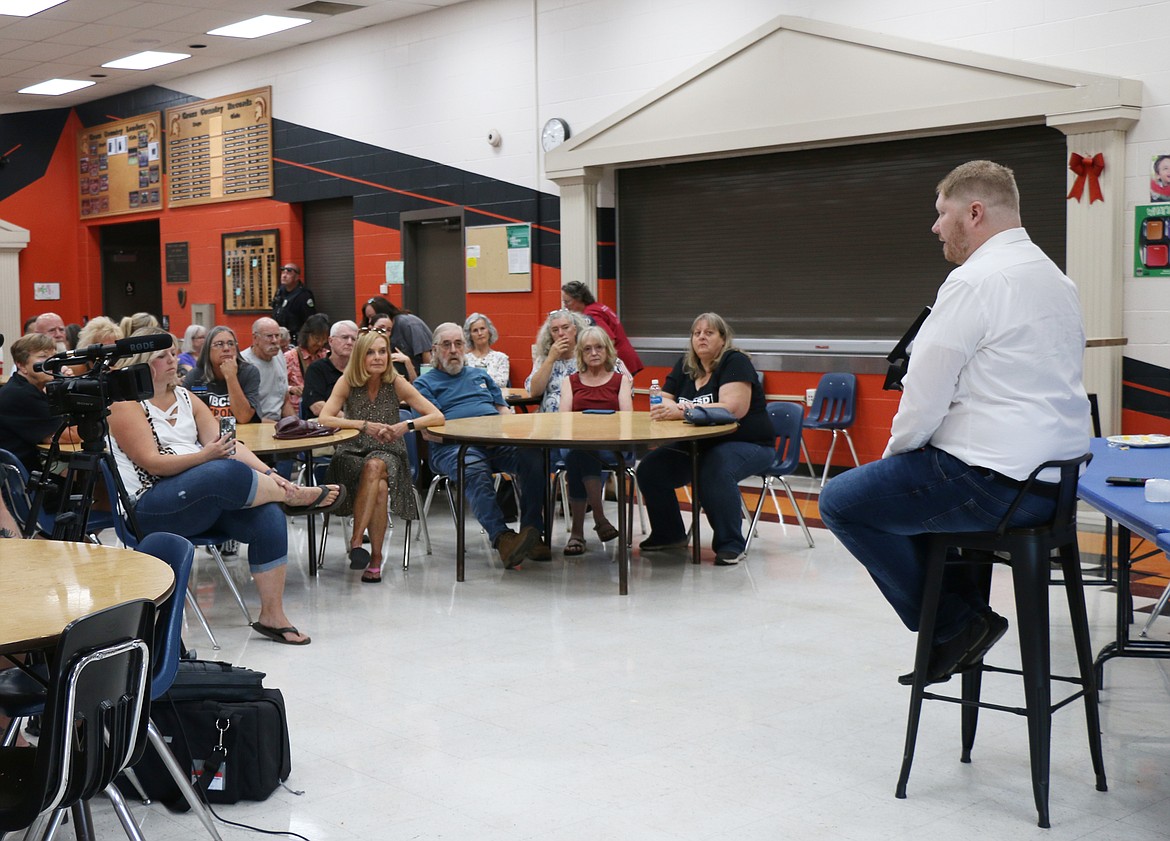Durst escalates dispute with state education leaders
PRIEST RIVER — While West Bonner considers legal action against the state, superintendent Branden Durst is delaying his promise to lead the district with an emergency certificate.
Durst disagrees with the opinion of state education leaders. He surmised that a district cannot have two superintendents with emergency certificates — his certificate (if granted) and the one held by his predecessor Susan Luckey, who was appointed interim superintendent from March through June, following the resignation of Jackie Branum.
The State Board of Education’s deputy director “indicated” that a district could not have two superintendents with provisional certifications at the same time, Durst told a town hall audience Saturday.
“Whether it was supposed to be approved or not, it is still in effect according to the State Board until Aug. 30. That means that if I were to apply before the end of that date, it would … ostensibly give them the authority to reject the application out of hand,” he said.
Yet the State Department of Education said Idaho Code 33-1203 does not specify that one certification is dependent on another, and therefore Durst is eligible to apply. What’s more, the State Board confirmed that Luckey’s certification was issued correctly, so no further action is needed — which should clear the way for Durst to apply.
But he disagrees, claiming his application could be denied on those grounds.
“I can tell you as a taxpayer, I do not support this fight” with the state, a parent told Durst at the meeting.
“There is no deadline in my contract that says I have to apply by a certain date,” Durst said. “We’re going to wait until the State Board no longer has a rational basis from their perspective to deny my application.”
In June, the hiring of Durst by a divided school board created an uproar in the community of Priest River. Trustees Susan Brown, Keith Rutlege and Troy Reinbold voted in favor of Durst, while Margaret Hall and Carlyn Barton voted against.
Durst is a former Democratic lawmaker and Republican state superintendent candidate, and an analyst for the conservative Idaho Freedom Foundation. Both chair Rutledge and vice chairman Brown are facing recall elections on Aug. 29.
When hired, Durst promised the community to lead with an emergency provisional certificate. Those certificates are granted by the State Board. Durst will miss the application deadline for two of their most recent meetings.
However, if he applies, Durst believes his application will be expedited — regardless of any application deadlines — because the State Board is likely tired of fielding phone calls about him.
After two months on the job, Durst continues to point a finger at the State Board to explain why he’s delaying that application. If approved, that certificate would give him the authority to fully act as a superintendent. The emergency certificate is required because Durst did not meet all the requirements to obtain a superintendent endorsement when the district hired him.
Delaying that application has evolved from board minutes not being posted correctly, to a constitutional crisis that threatens local control.
“That’s really what this is about. The constitutional crisis is now an unelected board — it was appointed by the governor in the executive branch — can tell any (school) board in the state of Idaho whether or not they’ve done something, even if they haven’t done it,” Durst said.
“And that is much bigger than frankly my application,” he said.
In its rebuttal to Rutledge, the State Board Director Matt Freeman wrote that the application packet asks for emergency declaration but does not impose such a requirement. “Nor does that statute prevent the State Board from independently assessing whether an emergency exists.”
Whether or not the school board recorded minutes officially recognizing the emergency is not relevant, because the State Board determined that an emergency existed from the “materials submitted by West Bonner County, in particular the emergency provisional certificate form submitted under (Rutledge’s) signature as Chair of the board,” according to Freeman.
Durst’s comments indicate that he’s preparing to lead without certification, because he’s already included his unfunded salary in the district’s 2023-24 general budget. Exactly how funds in that budget are to be allocated has not been released publicly on the district’s website.
Without proper certification, the Department of Education said Idaho code “directs the superintendent of public instruction” to withhold state payments to a local district for any professional positions being occupied by uncertified individuals. That means the state will not pay for Durst’s salary — the district pays.
But Durst said it’s not prudent to apply now, because the district’s attorney is on a cruise in the Baltic Sea.
“We’re not going to proceed without his guidance. I think it wouldn’t be prudent for us to do so. And so when he returns back to the country — we are hoping Monday — we will get an opinion from him and decide if they want to proceed with further legal action against the state, in conjunction with the Attorney General’s Office, who has already shown a willingness to take on state agencies when they’re doing things that are illegal and unconstitutional,” Durst said.
The State Board is not following Idaho code, according to Durst, and basically said, “‘We can do what we want.’”
This story was originally published by Idaho Education News on Tuesday.

